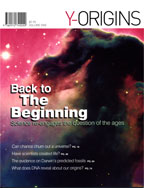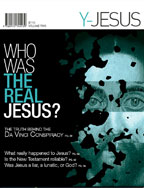BACK TO THE BEGINNING
Did the Universe Have a Beginning?
Scientific discoveries revive the ancient belief in a beginning to the universe. If we could rewind the history of the universe, what would we discover about its origin and development? Did it really have a beginning, or was it always there?
The influential ancient philosopher Aristotle stated, “It is impossible that movement should ever come into being or cease to be, for it must always have existed. Nor can time come into being or cease to be.”
Meanwhile, the biblical book of Genesis famously starts off, “In the beginning God created the heaven and the earth.”
Which is it? Is the universe eternal—has it always been here? Or did it have a start at some point in time—did it have a birthday, so to speak? These are the two schools of thought that have enrolled followers since early times. (Actually, there was also a third school that postulated that the universe existed on the back of a giant sea turtle, but they’re mostly gone now.)
The seesaw of opinion has tipped one way or the other over time. But lately the weight of evidence has all been coming down on the side of the birthday universe.
In the old days when the Christian church dominated Western society, the creation of the universe was taken for granted. But slowly the scientific viewpoint pushed aside creation as well as the Creator. Now many scientists are thinking that the idea of a creation may not have been so far off from the truth as they thought. It’s looking like the universe had a beginning after all.
Remarkably, one of the first scientists to swing the pendulum of opinion back to the birthday-universe position was so entrenched in eternal-universe thinking that at first he refused to believe his own conclusions.
Next | Endnotes
|




